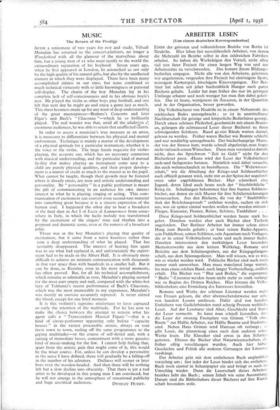MUSIC
The Return of the Prodigy
AFTER a retirement of two years for rest and study, Yehudi Menuhin has returned to the concert-platform, no longer a Wunderkind with all the glamour of the marvellous about him, but a young man of 21 who must justify to the world the extraordinary reputation of his boyhood. Seven years ago, when he first appeared in London, he astonished us not only by the high quality of his natural gifts, but also by the unaffected manner in which they were displayed. There have been many accomplished infants in our time, but none combined so much technical virtuosity with so little knowingness or personal self-display. The charm of the boy Menuhin lay in his complete lack of self-consciousness and in his obvious boyish zest. He played the violin as other boys play football, and one felt that next day he might go and enjoy a game just as much. This sheer keenness made up for any want of deep understanding of the great masterpieces—Brahms's Concerto and later Elgar's and Bach's " Chaconne "—which he so brilliantly played. The real wonder was that, amid all the adulation I enormous audiences, he was able to retain that unaffected charm.
In order to assess a musician's true measure as an artist, it is necessary to differentiate between his physical and mental endowment. Technique is mainly a matter of the development of a physical aptitude for a particular instrument, whether it is the voice or the violin. The large hands requisite for violin- playing, the accurate ear, which has no necessary connexion with musical understanding, and the particular kind of manual facility that makes playing an instrument come easy to a child are purely physical qualities, and their proper develop- ment is a matter of credit as much to the master as to the pupil. What cannot be taught, though their growth may be fostered where it already exists, are taste and artistic understanding and personality. By " personality " in a public performer is meant the gift of communicating to an audience his own intense interest in what he is playing, singing or acting. This com- munication of excitement can convert even second-rate material into something great because it is a sincere expression of the human soul. I happened the other day to hear a broadcast of the final duet in Act I of Lucia di Lammermoor from some- where in Italy, in which the facile melody was transformed by the excitement of the singers' tone and rhythm into a poignant and dramatic scene, even at the remove of a broadcast relay.
There was in the boy Menuhin's playing that quality of excitement, but it came from a naive keenness rather than rom a deep understanding of what he played. That has nevitably disappeared. The interest of hearing him again was to see what had replaced it, and unfcirtunately the experi- ment had to be made in the Albert Hall. It is obviously more difficult to achieve an intimate communication with thousands in that vast space than with hundreds in a smaller hall. But it can be done, as Kreisler, even in his most trivial moments, has often proved. But, for all his technical accomplishment, which remains as admirable as ever, Menuhin's playing seemed for the most part empty and null, compared with the white-hot fury of Telmanyi's recent performance of Bach's Chaconne, which was the most memorable in my experience, Menuhin's was merely an exercise accurately repeated. It never stirred the blood, except for one brief moment.
It is this violinist's supreme misfortune to have captured so early the attention of the multitude. For he has now to make the choice between the attempt to remain what his agent calls a " Transcendent Musical Figure "—that is a kind of circus-performer 'appearing only before " capacity houses " in the vastest procurable arenas, always on tour from town to town, reeling off the same programmes to the gaping multitudes—or the course of self-denial and, with a cutting of immediate losses, contentment with a more genuine kind of music-making for the few. I cannot help feeling that, apart from the artistic gain that might come of it, this would be the wiser course. For, unless he can develop a personality in the sense I have defined, there will gradually be a falling-off in the number of his admirers. Dullness will sooner or later bore even the wooden-headed. And then there will be nothing left but a slow decline into obscurity. That there is yet a real artist to be developed in this young man I am convinced, but he will not emerge in the atmosphere of sensational publicity














































 Previous page
Previous page